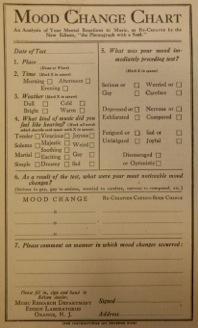This monograph project is a history of the co-construction of the environment and how one listens to it. Sonifying Space takes as its departure point the often-maligned music of waiting spaces, which has become more ubiquitous than ever: background music (environmental music or muzak). In the twentieth century, new technology contributed to new understandings and manipulations of the soundscape. The project explores the development of new listening practices and products by experimental and industrial psychologists, sound engineers, dystopian authors, avant-garde artists, and environmental composers, and aims to offer new insights into the dynamics of the dissemination of scientific knowledge about listening. At the core of the co-development of modern, technology-dependent background music and the active cultivation of new forms of listening was a feedback loop of testing increasingly functional applications of music—from experiments to surveys to recommendation algorithms—and an ambivalent acceptance of such applications by listeners. With each test of the efficacy of music (on happiness, focus, consumption, etc.), the subject gained awareness of the test, in turn altering the relationship between individuals’ and communities’ understanding of their sonic environment and their experience of it.

Mood Change Chart distributed by the Edison Phonograph Company to survey mood effects of various Edison records. In: William Maxwell Files, Thomas Edison National Historic Park.
Project
(2015-2019)
